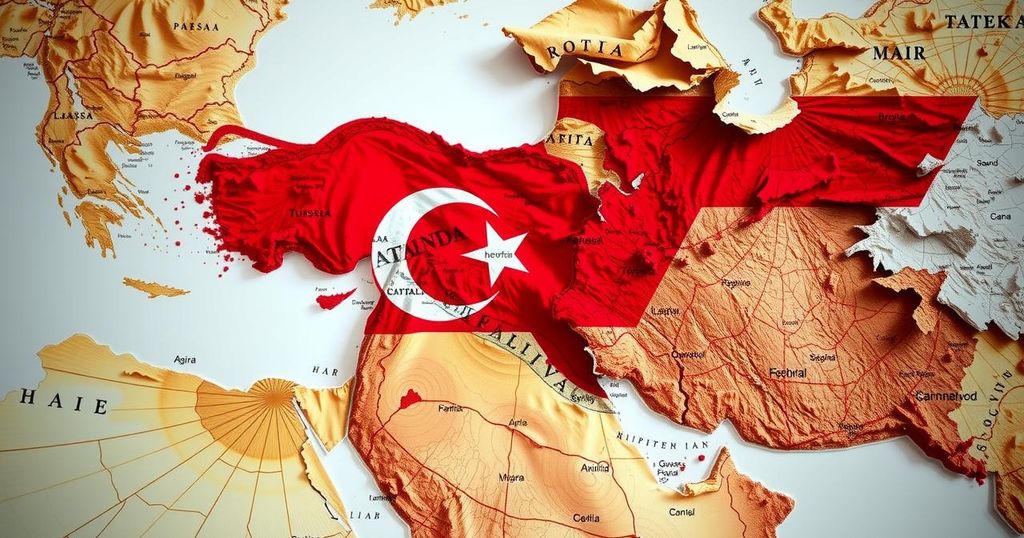Global news
AFGHANISTAN, AFRICA, ASIA, ASSAD, ENERGY SECURITY, ERDOĞAN, ERDOGAN, FOREIGN POLICY, HASSAN HASSAN, HEZBOLLAH, INTERNATIONAL RELATIONS, KURDISTAN WORKERS ’, KURDISTAN WORKERS ’ PARTY, LEBANON, LIBYA, MIDDLE EAST, NORTH AMERICA, PKK, SYRIA, SYRIAN CONFLICT, TAYYIP ERDOĞAN, UNITED STATES
Leila Ramsay
0 Comments
Turkey’s Rise in the Middle East: From Shia Crescent to Full Moon
Turkey’s increased influence in the Middle East follows the decline of Iran’s power and the Assad regime’s fall in Syria. Turkey’s consistent support for Syrian rebels and strategic military engagements across regions have transformed its status to that of a regional powerhouse. This shift complicates the traditional balance of power, particularly impacting Sunni-majority areas historically influenced by Iranian backing and creating new geopolitical challenges for established regional powers like Saudi Arabia.
The geopolitical landscape of the Middle East is undergoing a significant transformation as Turkey’s influence expands following the decline of Iran’s power and the Assad regime in Syria. Turkey, under President Recep Tayyip Erdoğan, has emerged as a regional power, supporting Syrian rebels and providing them with critical resources that facilitated their unexpected success with minimal destruction. This success not only disrupts the longstanding dominance of Iran’s Shia crescent but also enhances Turkey’s position throughout the region, influencing neighboring Iraq and extending its reach to Africa and beyond.
Notably, Turkey’s consistent support for the rebels near its northern border has played a pivotal role in their revitalization. While Iran struggles to maintain its grip on Syria, hindered by external pressures and internal crises, Turkey has strategically positioned itself as a central player. By fostering stability through ceasefires and ensuring continual support, Turkey has established itself as a vital force amid the shifting dynamics of power brought about by the Syrian civil war and Iran’s vulnerabilities.
Turkey’s ambitions, however, span far beyond Syria. Erdoğan’s leadership has seen Turkey mediate conflicts in regions such as Somalia and Ethiopia, while its military backing of the legitimate government in Libya illustrates its growing influence over Mediterranean energy resources. Furthermore, Turkey’s engagement with Afghanistan post-Taliban takeover indicates a calculated effort to enhance its role in Central Asia and beyond, aligning with nations that counter Iran’s historical influence.
The rise of Turkey is increasingly complex for Saudi Arabia and other Gulf states that traditionally claimed leadership of the Sunni Muslim world. Unlike Iran’s clear sectarian divides, Turkey’s Sunni status provides a nuanced challenge to established hierarchies, creating an alternative voice for many who may feel disenfranchised by the Gulf monarchies. This growing dominance positions Turkey uniquely, allowing it to act through local alliances rather than depending on proxy conflicts, as Iran has historically done.
The decline of Iran’s influence, marked by the fracturing of its so-called crescent, suggests a shift toward Turkish engagement in maintaining regional stability and influencing its governance. The changing allegiances across the Middle East could signal a new order where Turkey’s proactive diplomacy and investment strategies enable it to cultivate broader support across sectarian lines.
In conclusion, the realignment of power in the Middle East is evident, with Turkey assuming a central role while Iran’s hold is challenged. Rival states and their allies must now navigate a landscape where Turkey’s growing assertiveness is reshaping both diplomatic relations and regional dynamics. As these strategies unfold, the future of Middle Eastern geopolitics will be determined less by Iran’s ambitions and more by Turkey’s decisions and influence.
The article discusses the recent geopolitical shift in the Middle East, particularly focusing on Turkey’s increasing influence following the weakening of Iran due to the fall of the Assad regime in Syria. It highlights Turkey’s strategic actions and broader ambitions across several regions, including Iraq, Africa, and the Caucasus, as well as the implications for traditional players in the region, such as Saudi Arabia and Iran. The article also reflects on how these dynamics could reshape alliances and the balance of power in the Middle East.
The evolving power dynamics in the Middle East highlight Turkey’s ascent as a significant regional actor, marking a departure from Iran’s previous dominance. As Turkey expands its influence through diverse military, political, and economic engagements, it poses a unique challenge to traditional powers like Saudi Arabia and Iran. The consequent changes in alliances and the broader geopolitical landscape will require adaptations from all stakeholders as they respond to Turkey’s growing assertiveness.
Original Source: www.theguardian.com




Post Comment